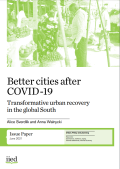
Electrifying vehicles in ride-hailing services, such as Uber and Lyft, is critical to accelerating the EV transition and provides key catalytic opportunities: lowering EV operational cost, creating a profitable investment opportunity for building fast-charging infrastructure, and equitably expanding EV charging capacity for all.
This World Bank study explores economic impacts on local economies, as local economic development is a goal in-and-of itself, and community support is a critical concern for protected areas and is needed to secure their long-term integrity. It also estimates protected area tourism’s economic costs and benefits to local communities, and explores how benefits may be increased and costs reduced.
A debt crisis is looming in the Global South. Although international capital has partially returned to developing and emerging economies, in many low- and middle-income countries debt service is impeding crisis responses and contributing to worsening development prospects and a compromised ability to adapt to the impending climate crisis as well as threatening the achievement of the SDGs.
NGFS and INSPIRE have established a joint Study Group on Biodiversity and Financial Stability, with the aim to understand the potential implications of biodiversity loss for financial stability.

This issue paper proposes a novel framework to support a transformative recovery in cities of the global South after COVID-19.
